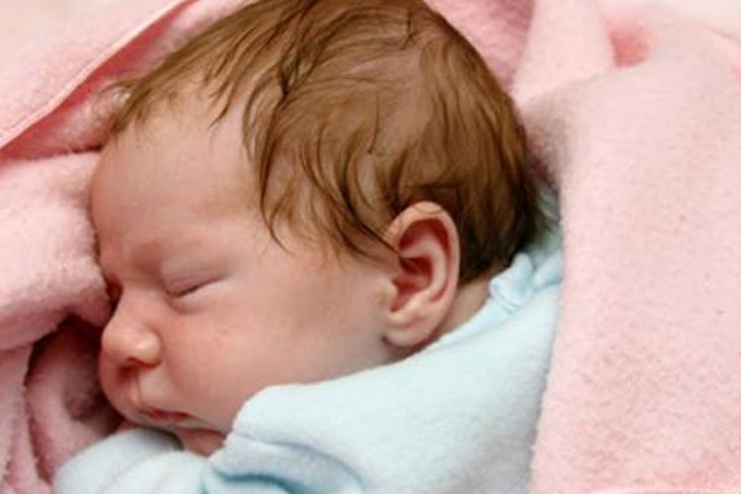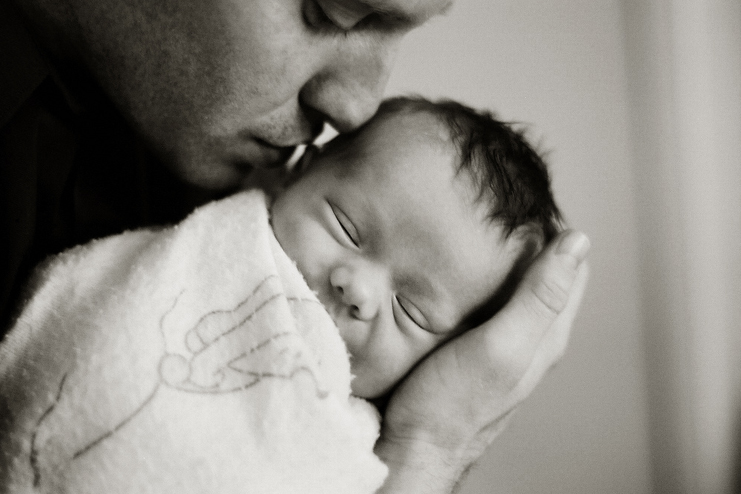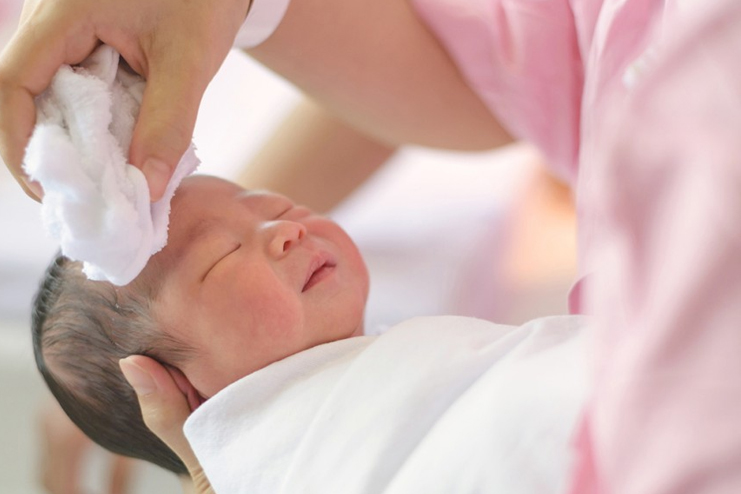The most cherished moments of the motherhood is to hold the baby in arms after the tremendous waiting of 9 months. It is a great experience to have your cute baby with you after a long stay in the watery uterus followed by risky adventure through the birth canal.
This is a new life for both the mother and new born baby. New borns show many signs of development as they grow. You need to know what your baby needs to achieve each month.
This article takes you through the tour of milestones that your one week old baby should achieve.
1 Week old baby’s development:

Savour all the joy of holding your baby and those first cuddles. Start to form the emotional bonding attachment with your little one. New born baby needs some energy to get adjusted to the daily routines. Here is the overview of the things that you can expect from your new born baby:
● Your new born is able to focus on the things which are straight away at 15 inches. Your baby may not be able to turn the head all around.
● You may notice some of the in built reflexes in your new born. For example, if you stroke your newborn baby’s cheek he will turn in that direction. This is one of their natural reflexes to locate breast or bottle.
● The average weight of the new born baby will be around 3 kgs with a height of around 20 inches.
● You may notice that your new born baby may lose some weight few days after the birth. New born baby’s look swollen after residing in the fluid for 9 months. Baby’s have the capability to evaporate the excess fluid from the body few days after the birth.
● New borns sleep for more than 17 hours a day during the first week of their birth which may gradually decrease after the few days.
Don’t worry if your new born does not meet the expectations. The developmental abilities may vary from one baby to the other.
1 Week Old baby milestones:
The first week is the period of adjustment for both the parents and the new born. During the first week your new born experiences the sounds, sights, and smells which are completely foreign to them. Here are a few milestones that new born is expected to meet during the first one year.
1. Sleep routines:
New born babies may start for about 16-17 hours a days but not at a single time. One year old usually sleep for about 2-3 hours at a time in the day or in the night. These short sleeps may be broken by the ardour to hunger. This may make you sometimes feel tired. New borns demand little amounts of milk for more times in a day. Your baby’s sleep schedules should depend on how long your baby can stay awake and it should be strictly confined with the clock.
Your baby needs to be fed a small amount of milk for every two hours.
2. Baby’s sleeping position:
The safest position for the new born babies while sleeping is to lie on their back. Never allow your baby to sleep on their tummy during the first week which may lead to Sudden Infant Death Syndrome (SIDS).
3. Natural Reflexes:
New borns are gifted with some natural reflexes. Reflexes are involuntary movements or actions some occur as a part of baby’s normal activity and some others are the responses to some specific actions. Babies have the ability to move both their arms and legs equally.
The two main reflexes that your new born exhibits during their first week are:
● If you touch your baby’s palm with finger, they will grab it and don’t let it go. This is one of the most amazing experiences for the parents.
● When the babies are stroked on their cheeks, they immediately turn in their direction and start sucking movements.
4. Feeding schedule and nutrition:
New born babies should be fed for every 2 hours a day and they should not be left without feeding for more than 4 hours. New born babies may seem drowsy all the time in a day and rarely show interest to fill up their tummy. Try implementing the techniques to transition your baby into the active state. Unwrap your baby from the swaddle so that their sleep may get distracted by the cool air. Trigger your baby’s sucking reflexes by gently stroking their mouth.
Make yourself ready to pick up the appetite of your baby once they wean off from drowsiness.
5. Make your baby responsive to sounds:
New born babies most commonly exhibit certain reflexes in reaction to the sounds ranging from medium to greater intensity. Babies sometimes startle in response to certain sounds. This response is known as startle reflex.
6. Strengthen the attachment with your new born during the first week:
New born babies can recognize the voice of their mothers as they have listened the voices of their mothers for 9 months in the womb. Strengthen your bonding by communicating with your new born using touch, sight, and smell.
Offer more cuddles to your baby that makes them feel safe and secure. Babies often display their cues and body languages during the first week of their life. Emotional bonding and attachment with your baby promotes both the physical and mental health.
7. 1 week old baby response to touch:
Touch is one of the sensory developments of your newborn baby. Baby begins to develop their sense of touch when they are in the womb. Some areas of the baby’s body that are sensitive to the touch are face, cheeks, hands, abdomen, and soles of feet.
By the age of 3 months, babies develop many preferences. They develop strong responses to touch, textures that they find soothing or uncomfortable.
8. Baby’s Head Shape:
Sometimes baby’s may have uneven heads when they are pulled out through the birth canal. Babies may also develop the uneven heads when they rest at the same position for the longer time. Their head can be easily moulded by the pressure exerted when the babies lie on their back.
There are two sensitive & soft areas at the top your baby’s head known as fontanels. Skill bones may take some time to develop in these spots. There are many ways to mould their heads into proper position. Don’t miss the bundles of joy and fun with your new born while thinking about their uneven head.
9. Baby’s Umbilical Cord:
Once the umbilical cord is after the birth, the tissues remain attached to the stump of your baby’s belly button. The stump usually dries off and falls off within 1-2 weeks after the birth. In Meantime, keep that area dry and treat with gentle care. Parents are instructed the dab the stump with surgical spirit after every diaper change.
10. Baby’s Health and safety:
One of the major tests that baby undergoes soon after the delivery is APGAR. This test is meant to check the Appearance, Pulse, Grimace, Activity, and Respiration. Doctors may decide about the medical intervention depending on the status of these 5 factors.
Babies have immature immune system and the only antibiotic that you can offer them to fight against the bacteria and infections in Breastmilk. Dress your baby appropriately as per the room temperature and keep them away from the risk of SIDS.
11. Baby’s Sounds:
Babies may tend to produce the sounds while they are taking short and long breaths. They also make sounds while playing or pooping.
12. Baby’s Poop:
Baby’s poop may be thick, watery, and green during the first week of their birth. This is due to the deposits of the substance called meconium, when your baby resides in the womb as foetus.
Over a period of time, the poop may become yellow.
13. Baby’s behaviour:
Parents and relatives may try to estimate the baby’s behaviour and character based on their responses during their first week. They may infer the babies as calm, troublemaker etc. Most babies sleep in a calm manner when they are fed properly.
New born babies look around for the new voices and sounds.
14. Weight gain and body shape for one week old baby:
Babies may lose 10-50% their weight during the first week of their birth. Breastfed babies have the capability to regain their weight in 2-3 weeks. Babies usually double their weights at the age of 6 months. On an average, babies need to gain 150 to 200 grams each week from the birth to 3 months of age. The rate of weight gain plays a prominent role in the overall health and development of the baby.
Any swelling in your baby’s face and around the eyes may disappear in few days.
Comforting Measures for the 1 week old baby:

Here are a few comforting measures that the babies need at every stage of the development for the proper growth.
1. Basic Comforting Needs:
These are the main basic needs that every baby requires.
• Nursing
• Burping after every feeding
• Frequent diaper changing
• Dressing baby properly as per the room temperature
2. Comforting Touch:
Here are a few ways to offer comforting touch for the baby:
• Hold the baby properly
• Carry the baby in a soft carrier
• Give your baby a gentle back rub
• Offer some tummy time for the baby and gently pat the back
• Give daily massage with baby oil.
3. Reduce the stimulation:
Babies may become overstimulated when they are exposed to the activities, noises, and sensations beyond that they can cope. For example, babies may get overstimulated where they may get cuddled by many grown ups. Here are a few tips to reduce over stimulation in babies:
Proper swaddling can help the baby to calm down and promote the sleep.
Dim the lights in your baby’s room and reduce all the noise sources.
4. Comforting Sounds:
Comforting sounds are very important to soothe the baby. Some of the soothing sounds include:
• Play some variety of sounds with various voices and observe the type of voice which your baby prefers to listen or likes most.
• Sing to your baby
• Some babies may prefer to listen white noises which produces the noises of various frequencies with the same intensity.
5. Rhythmic Movements:
Rhythmic movements will help to promote your baby’s participation and attention to the environment around them. Babies are known to have strong sense of rhythm right from the birth.
Here are a few rhythmic movements to enhance the senses of your baby:
• Nurse your baby in motion which might help them to improve grip over the sucking even when they are in motion.
• Hold and bounce your baby gently
• Walk somewhere inside or outside of the house by holding your baby in the sling.
• Take your baby in the stroller for walk and offer some peaceful green time.
In conclusion, it is not mandatory for the babies to achieve specific milestones in a particular week.
1 Week Old Baby Care Tips and Precautions:

Here are a few tips that you should know while your baby is crossing the milestones:
1. Hydrate your baby:
Make sure to keep your baby hydrated all the time. Lack of adequate fluids may put your baby at the risk of diarrhea. Feed your baby in small quantities more frequently. Observe the hunger reflexes of your baby and do not feed them forcefully.
2. Dress your baby in a comfortable outfit:
The most important factor to rejuvenate your baby is the dress that you wear them in. Dress your baby in season specific clothing. Dress your baby in a single layer clothing during the summer and don’t overdress them in the winter which may make them irritated. Make sure that the clothes should not rub against your baby’s skin leading to irritation.
3. Make sure that baby sleeps in a safe position:
Most preferable and the safe way for the babies to sleep during the first week of their birth is to lie on their back as their back have very gentle and undeveloped backbones. It is not recommended for the babies to lie on sides during their first week.
4. Feed your baby in a right position:
Babies demand the milk many times during the sleep in their night. It is not the right way to breastfeed your baby in lying position. This position propounds many discomforts in the baby. This position does not offer a convenient way for the passage of the milk. The best feeding position for your baby is to get up and hold your baby in the upright position.
5. Ensure to get the vaccinations:
Three vaccines are given to the babies during the first week of their birth. One vaccine is administered to the baby within 12 hours of the birth known as hepatitis B vaccine. The main purpose of this vaccine is to protect the liver from any infections.
The other two vaccines are Polio IPV vaccine and tuberculosis BCG vaccine.
6. Wash your baby’s clothing regularly:
Wash your baby’s clothes including blankets, beds more frequently in hot water. Use baby specific detergents and soaps which are safe for your baby’s skin.
When to consult your Doctor?
It is advised to consult your doctor if you come across the following signs:
1. Dehydration: babies usually wet their diapers more frequently and after every feeding. If the babies diaper remain dry for more than 2 hours and their lips become chapped, then consult your doctor. The symptoms of dehydration sometimes may be accompanied by chapped or dry lips, dry skin or peeling of the skin.
2. Hiccups: Hiccups are quite common for the new born babies. If your baby has continuous hiccups and finding difficulty while passing the hiccups consult your doctor.
3. Jaundice: Discoloration of the eyes and the skin into yellow is the sign of Jaundice in babies. Jaundice is common in new born babies and the most common treatment for the Jaundice is phototherapy and the proper exposure to sunlight is essential for the fast recovery.
4. Discharge from the eyes: As their tear ducts are yet to be developed, it is more common for the babies to have sticky eyes and little discharge from the eyes. But you should check with your paediatrician for the excessive flow and swollen eyes.
In conclusion, different babies reach their milestones at their own velocity. Premature babies may take some more time to reach their milestones. Irrespective of milestones the ultimate goal of every new born is to get plenty of love and affection from their parents.
Moving forward, you might find no time to play and have joyful time with your new born. So, enjoy each and every moment heartfully with your new born.










































